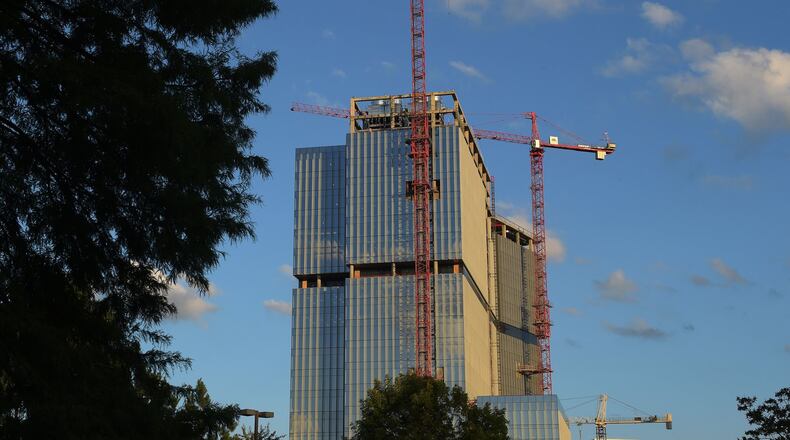Like a good neighbor, State Farm is there — but your tax money isn’t.
The nation's largest property insurance company backed off its pursuit of $15 million in tax incentives to build a Dunwoody office tower that's almost completely constructed, said spokesman Justin Tomczak in a statement Monday.
State Farm withdrew its request for a property tax break amid questions from Dunwoody's economic development board about its necessity, since the company had already committed to consolidate offices on the 17-acre campus near Perimeter Mall. Tax incentives are usually designed to encourage businesses to relocate or expand.
The insurer and its developer, Dallas-based KDC, still intend to seek $34 million in public support for two more office towers being considered for the site.
The first office tower is scheduled to open by the end of this year, with 13 stories of office space and eight levels of above-grade parking.
"State Farm is in Dunwoody. Therefore, they're going to build out whether we give them a tax abatement or not. That's not my opinion; that's a fact," said Bill Robinson, the vice chairman of the Dunwoody Development Authority.
When State Farm decided against seeking tax breaks for the first office tower, “that relieved what might have been a problem for them,” he said.
Public financial support for business development projects like State Farm's comes from a discount on property taxes the company would otherwise pay to DeKalb's school system, county government and city's government.
The Dunwoody Development Authority, made up of citizens appointed by the city’s council and mayor, has the power under state law to give tax abatements.
“Everyone understands that, to provide a tax abatement for a project that’s almost finished, made very little sense,” said Robert Wittenstein, president of the Dunwoody Homeowners Association. “These abatements are somewhat controversial, and they (development authority members) try to use them judiciously.”
The almost-finished office tower is a $175 million real property investment, and it will become the workplace for about 2,500 State Farm employees with average wages of $56,500, according to a fiscal impact study by the Georgia Tech Enterprise Innovation Institute.
It’s unclear when or if the next two towers would be built. They would add another 5,000 workers to State Farm’s Dunwoody campus.
The developer had said State Farm needed the full amount of the tax incentives — $48.6 million for all three buildings — to move up its construction schedule and break ground on the project’s second phase next year. Under the project’s original schedule, work on the next buildings wouldn’t start until 2020.
The Dunwoody Development Authority will require a guarantee that the second phase starts in 2017 or 2018 before it awards the tax incentives, said Michael Starling, the city’s economic development director.
In all, the project represents $595 million in real property investment over the next five years, according to the Georgia Tech study. The three buildings will provide about 1.8 million square feet of office space, and a fourth building could be added in the future.
Sen. Fran Millar, whose district covers Dunwoody, said tax incentives should be negotiated before a company begins construction.
“Why would we give money for something that’s already built?” asked Millar, R-Atlanta. “Coming back after the fact like that doesn’t look very good. If they had negotiated it up front, they probably would have gotten it for the first building.”
The authority could consider whether to award tax breaks for the next two State Farm buildings at a meeting tentatively planned for late October.
About the Author
Keep Reading
The Latest
Featured




